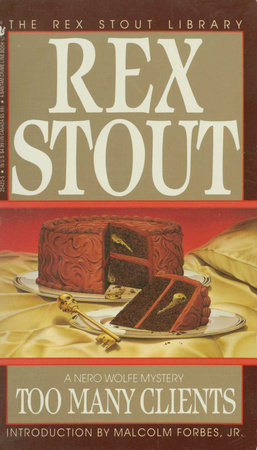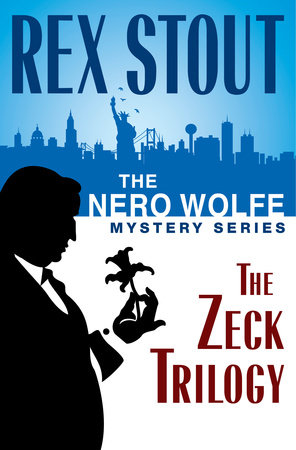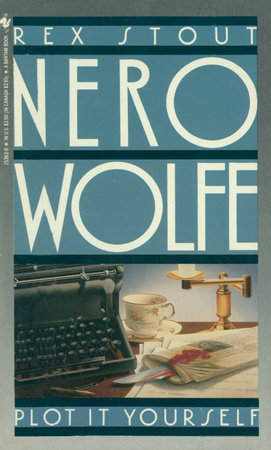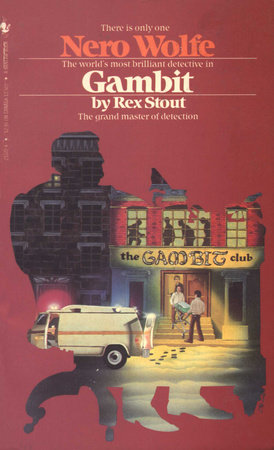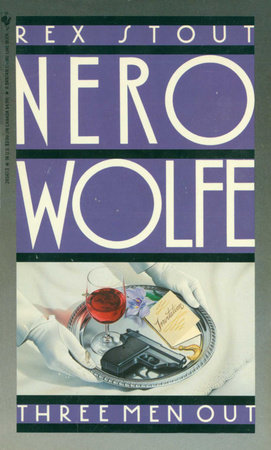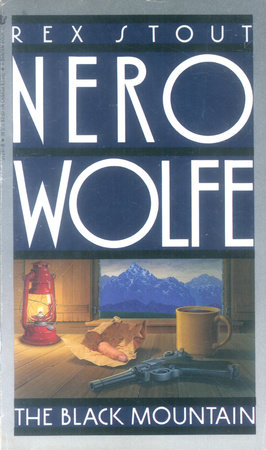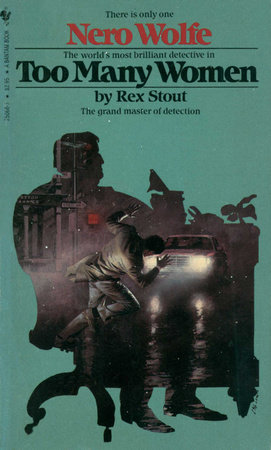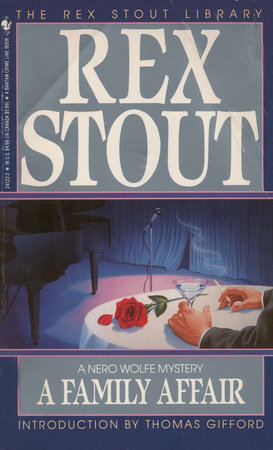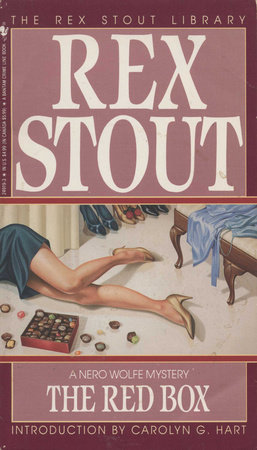Excerpt
Too Many Clients
Chapter 1
When he had got deposited in the red leather chair I went to my desk, whirled my chair to face him, sat, and regarded him politely but without enthusiasm. It was only partly that his $39.95 suit didn’t fit and needed pressing and his $3.00 shirt was on its second or third day; it was more him than his clothes. There was nothing wrong with his long bony face and broad forehead, but he simply didn’t have the air of a man who might make a sizable contribution to Nero Wolfe’s bank balance.
Which at that moment, that Monday afternoon in early May, was down to $14,194.62, after deducting the checks I had just drawn and put on Wolfe’s desk for him to sign. That may look fairly respectable, but. What with the weekly wages of Theodore Horstmann, the orchid valet, Fritz Brenner, chef and house steward, and me, the handy man; and with grocery bills, including such items as the fresh caviar which Wolfe sometimes stirred into his coddled eggs at breakfast; and with the various needs of the orchids in the plant rooms up on the roof of the old brownstone, not to mention new additions to the collection; and with this and that and these and those, the minimum monthly outgo of that establishment averaged more than five grand. Also, the June 15 income-tax installment would be due in five weeks. So, with no prospect of a fat fee in sight, it was beginning to look as if a trip to the safe-deposit box might be called for before the Fourth of July.
Therefore, when the doorbell had rung and, going to the hall for a look through the one-way glass of the front door, I had seen an adult male stranger with no sample case, it had seemed fitting to open the door wide and give him a cordial eye. He had said, “This is Nero Wolfe’s house, isn’t it?” and I had said yes but Mr. Wolfe wouldn’t be available until six o’clock, and he had said, “I know, he’s up in the plant rooms from four to six, but I want to see Archie Goodwin. You’re Mr. Goodwin?” I had admitted it and asked him what about, and he had said he wanted to consult me professionally. By then I had sized him up, or thought I had, and it didn’t look very promising, but time could be wasted with him as well as without him, so I had taken him to the office. Another point against him was that he had no hat. Ninety-eight per cent of men who can pay big fees wear hats.
Leaning back in the red leather chair with his chin lowered and his intelligent gray eyes aimed at me, he spoke. “I’ll have to tell you who I am, of course.”
I shook my head. “Not unless it’s material.”
“It is.” He crossed his legs. The tops of his socks, gray with little red dots, were down nearly to his shoes. “Else there was no use coming. I want to consult you in the strictest confidence.”
I nodded. “Naturally. But this is Nero Wolfe’s office, and I work for him. If you get a bill it will be from him.”
“I know.” Apparently that was a triviality. His eyes were intelligent. “I expect a bill and I’ll pay it. I can speak in assured confidence?”
“Certainly. Unless you’re loaded with something too heavy for me to hold, like murder or treason.”
He smiled. “Other sins only speak; murder shrieks out. Treason doth never prosper. I am loaded with neither. None of my crimes is statutory. Then in confidence, Mr. Goodwin, my name is Yeager, Thomas G. Yeager. You may possibly have seen or heard it, though I am no celebrity. I live at Three-forty East Sixty-eighth Street. My firm, of which I am executive vice-president, is Continental Plastic Products, with offices in the Empire State Building.”
I did not blink. Continental Plastic Products might be a giant with three or four floors, or it might have two small rooms with the only phone on the executive vice-president’s desk. Even so, I knew that block of East 68th Street, and it was no slum, far from it. This character might wear a $39.95 suit because he didn’t give a damn and didn’t have to. I know a chairman of the board of a billion-dollar corporation, one of the 2 per cent, who never gets his shoes shined and shaves three times a week.
I had my notebook and was writing in it. Yeager was saying, “My phone number is not listed. It’s Chisholm five, three-two-three-two. I came at a time when I knew Wolfe would be busy, to see you, because there’s no point in explaining it to him since he would merely assign you to it. I think I am being followed, and I want to make sure, and if I am I want to know who is following me.”
“That’s kindergarten stuff.” I tossed the notebook on my desk. “Any reputable agency will handle that for you at ten dollars an hour. Mr. Wolfe has a different approach to the fee question.”
“I know he has. That’s unimportant.” He waved it away. “But it’s vitally important to find out if I’m being followed, and quickly, and especially who it is. What agency at ten dollars an hour would have a man as good as you?”
“That’s not the point. Even if I’m only half as good as I think I am it would still be a pity to waste me on spotting a tail. And what if there’s no tail to spot? How long would it take to convince you? Say ten days, twelve hours a day, at a hundred dollars an hour. Twelve thousand bucks plus expenses. Even if you—”
“It wouldn’t be ten days.” He had lifted his chin. “I’m sure it wouldn’t. And it wouldn’t be twelve hours a day. If you’ll let me explain, Mr. Goodwin. I think I am being followed only at certain times, or that I will be. Specifically, I suspect that I shall be followed when I leave my house this evening at seven o’clock to go crosstown, across the park, to an address on Eighty-second Street. One-fifty-six West Eighty-second Street. Perhaps the best plan would be for you to be at my house when I leave, but of course I shall leave the tactics to you. I don’t want to be followed to that address. I don’t want it known that I have any connection with it. If I am not followed, that would end it for today, and I would call on you again only when I intend to go there again.”
“When would that be?”
“I can’t say definitely. Possibly later in the week, perhaps some day next week. I could notify you a day in advance.”
“How will you go, your car or a taxi?”
“Taxi.”
“Which is more important to you, not to be followed to that address, or to know whether you’re followed or not, or to identify the tail if you have one?”
“They’re all important.”
“Well.” I screwed my lips. “I admit it’s a little special. I mentioned a hundred dollars an hour, but that’s for routine. The shoe would have to fit the foot, with Mr. Wolfe doing the fitting and you the footing.”
He smiled. “There will be no difficulty about that. Then I’ll expect you around seven. A little before?”
“Probably.” I got my notebook. “Will the tail be someone you know?”
“I don’t know. It might be.”
“Man or woman?”
“I couldn’t say. I don’t know.”
“An operative or a do-it-yourself?”
“I don’t know. It could be either.”
“Spotting him will be simple. Then what? If he’s an operative I might recognize him, but that wouldn’t help much. Of course I can pull him off whether I recognize him or not, but I can’t squeeze his client’s name out of him.”
“But you can pull him off?”
“Sure. How much would the client’s name be worth to you? It might come high.”
“I don’t think …” He hesitated. “I don’t believe I would care to do that.”
That didn’t seem to fit, but I skipped it. “If it’s someone on his own, of course I’ll pull him off, and what else? Do you want him to know he’s been spotted?”
He considered it for three seconds. “I think not. Better not, I think.”
“Then I can’t snap a picture of him. I can only give you a description.”
“That will suffice.”
“Okay.” I dropped the notebook on my desk. “Your address on Sixty-eighth Street, that’s not an apartment building, is it?”
“No, it’s a house. My house.”
“Then I shouldn’t enter it and I shouldn’t get too near it. If it’s an operative he would probably recognize me. This is how it will be. At seven o’clock on the dot you will leave the house, walk to Second Avenue—don’t cross it—and turn left. About thirty paces from the corner is a lunchroom, and in front—”
“How do you happen to know that?”
“There aren’t many blocks in Manhattan I don’t know. In front of the lunchroom, either at the curb or double-parked, a blue and yellow taxi will be standing with the driver in it and the flag down. The driver will have a big square face and big ears. You will say to him, ‘You need a shave,’ and he will say, ‘My face is tender.’ To make sure, when you get in look at his name on the card. It will be Albert Goller.” I spelled it. “Do you want to write it down?”
“No.”
“Then don’t forget it. Give him the address on West Eighty-second Street and sit back and relax. That’s all for you. Whatever the driver does, he’ll know what he’s doing. Don’t keep looking back; that might make it a little harder.”


